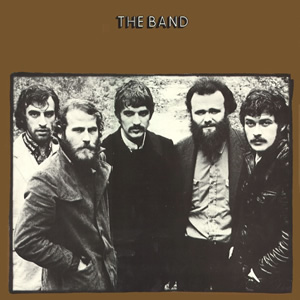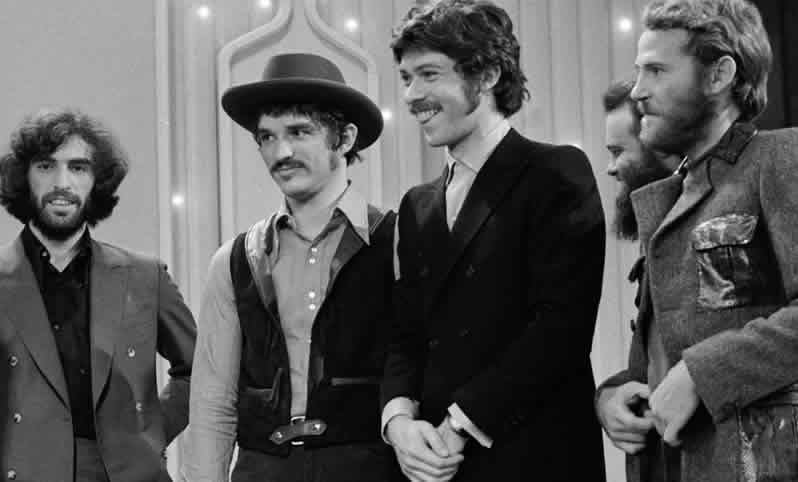The Band 1969 album
 As a perfect counterpart to Music from Big Pink, their 1968 debut album, The Band embarked on part two of their new musical, North American roots journey with their eponymous second album in 1969. It was as if to say that the debut was no mistake, the group upped the ante by declaring in the liner notes that “the songs focus on people, places and traditions associated with an older version of Americana…” This recording was a critical and commercial success on all fronts, reaching the Top 10 on the pop album charts and eventually preserved into the US National Recording Registry due to its “cultural and historical importance”.
As a perfect counterpart to Music from Big Pink, their 1968 debut album, The Band embarked on part two of their new musical, North American roots journey with their eponymous second album in 1969. It was as if to say that the debut was no mistake, the group upped the ante by declaring in the liner notes that “the songs focus on people, places and traditions associated with an older version of Americana…” This recording was a critical and commercial success on all fronts, reaching the Top 10 on the pop album charts and eventually preserved into the US National Recording Registry due to its “cultural and historical importance”.
The album that would eventually become known by some as “The Brown Album” was recorded between gigs as the group played their first live shows, starting in early 1969 through an appearance at the Woodstock Festival in August which happened to be named after the town adjoining their “big pink” dwelling which gave the Band’s debut album its title. The album was recorded in Los Angeles and featured songs mainly written by guitarist Robbie Robertson and produced by John Simon, who also provided much of the brass instrumentation on the album.
With this second, strong album, the Band came into their own as a viable, independent group, breaking out of the shadow of Bob Dylan, who they had previously backed up and began their debut album with. The blend of rural Americana and urban-centric rock really struck a chord with listeners as the mature musicians who began their musical journey in the 1950s found broad appeal in the post-psychedelic era.
 The Band by The Band |
|
|---|---|
| Released: September 22, 1969 (Capitol) Produced by: John Simon Recorded: West Hollywood, CA, Early to Mid 1969 |
|
| Side One | Side Two |
| Across the Great Divide Rag Mama Rag The Night They Drove Old Dixie Down When You Awake Up On Cripple Creek Whispering Pines |
Jemima Surrender Rockin’ Chair Look Out Cleveland Jawbone The Unfaithful Servant King Harvest (Has Surely Come) |
| Band Musicians | |
| Robbie Robertson – Guitars, Vocals Richard Manuel – Piano, Keyboards, Saxophone, Vocals Garth Hudson – Piano, Organ, Clavinet, Saxophone Rick Danko – Bass, Fiddle, Vocals Levon Helm – Drums, Percussion, Vocals |
|
“Across the Great Divide” starts as a spiritual before breaking into a steady rocker. There are effective keyboards bass and drums from Rick Danko and Levon Helm. The shortest song on the album, this acts as a nice intro track for The Band. The title “Rag Mama Rag” leaves no mystery to the song’s style and features Helm on mandolin and Danko on fiddle. The song was released as a single and reached the Top 40.
Although not released as a single, “The Night They Drove Old Dixie Down” has become one of the most popular songs by the group. While written by the Canadian born Robertson, the song convincingly tells of the last days of the American Civil War and the culture of Antebellum. Musically, the song paints a vivid picture perfectly of the human sense of history and aura of authenticity.
Pianist Richard Manuel co-wrote and sang, “When You Awake”, a steady and melodic ballad. In contrast, the choppy, upbeat rhythms of “Up on Cripple Creek”, paired with the ever-present clavichord of Garth Hudson helps make this song indelible. The multi-verse format leaves signs of Dylan influence but, overall, The Band’s sound makes this undeniably original. Helm’s lead vocals, from barking out the verses to yodeling the outro are constantly loose and carefree while Hudson tactfully applies a wah pedal to his clavichord during the breaks after the choruses. “Whispering Pines” is a unique ballad with dark, almost psychedelic organ accompanying the minor key piano by Manuel. There is a definite Grateful Dead influence, making it both haunting and beautiful.

The second side opens with “Jemima Surrender”, co-written by Helm with a melody very similar to “Up On Crippled Creek”. However, it is musically much different, driven by ever-present piano licks along with other musical motifs on guitar and horns. “Rockin’ Chair” is bluegrass to the core. Acoustic guitar, mandolin, and fiddle sets the rustic mood and paints the perfect picture of a porch jam, while providing great variety for this album, as nothing else is quite like this on The Band. “Look Out Cleveland” is the most rock-oriented song on the second side with interesting rhythms and fills, especially Danko’s sizzling bass and Robertson’s bluesy guitar riffs.
“Jawbone” is a very interesting hybrid of a song – from spiritual to waltz to a rock-riff oriented verse. The song has diverse qualities which barely jive, but jive nonetheless, to make it an excellent listen and the best song on side two of the album. The mood is then brought down a bit with “The Unfaithful Servant”, an acoustic and piano ballad where Simon’s horns add a wild, almost spooky element to the otherwise typical country-waltz. The closer “King Harvest (Has Surely Come)” provides yet one more surprise, being funky and jazzy musically like nothing else preceding it. Although credited solely to Robertson, this was really a group effort and a very strong selection to finish the album.
Following the release and success of The Band, the fame and attention to the group, along with the press anointing Robertson as the “leader”, started to take toll on the band’s chemistry. Still, they continued to tour and make great music right through The Last Waltz in 1976, when they retired from touring with a massive farewell concert.
~
Part of Classic Rock Review’s celebration of 1969 albums.





Top 9 Battle Themed Songs | River of Rock
April 24, 2016 @ 6:46 pm
[…] Album review of The Band […]
"Up On Crippled Creek" by The Band | River of Rock
September 1, 2017 @ 5:25 pm
[…] Produced by John Simon Recorded at Pool House, West Hollywood, CA, Late 1968 Released on the album The Band in September […]
22.09.1969: The Band veröffentlicht gleichnamige LP | zoom
September 21, 2019 @ 4:00 pm
[…] The Band (Rezension) Classic Rock Review, […]